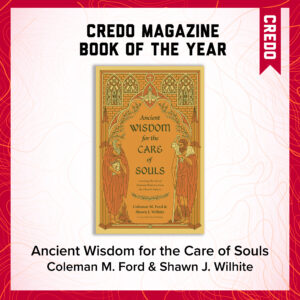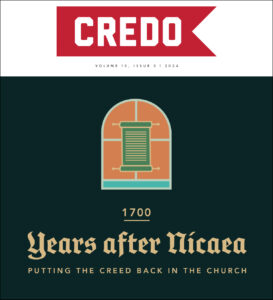After taking a church class on the Trinity, a church member said to me (Shawn), “Learning about the Trinity is like walking through the wardrobe into Narnia.” A sense of mystery and wonder meet Christians when they step through the Trinitarian wardrobe for the first time because God is the great mystery of Christian theology and the central confession of the Christian tradition. Once believers see the first few lampposts, they realize they are about to embark on an amazing journey that will forever alter their lives.
But if God is eternally mysterious, to what extent can we know him and help others know him? Pragmatism often governs our answer. Do we even have the time to consider this topic more deeply? Is the Trinity practical or useful? Early in my ministry, I decided to preach through Job, and one lesson I learned deeply affected me: when trials and suffering overwhelm you, rest in a God who self-reveals. Near the end of this book, God reveals himself to Job, but he offers little insight into the meaning of suffering, bypassing reasons for why it happens and instead speaking of his greater purposes. This taught me that in order to minister to suffering Christians, pastors need to know more about God.
When reflecting on their training in Trinitarian doctrine, many ministers express grief and remorse. Though they may have learned much about the Christian life, they were never taught about God’s nature and feel they missed out on knowing God more fully. Further, reflecting on divine mystery does not fit easily into the schedule of a busy pastor or church, especially when pragmatism or anti-intellectualism has already gained a foothold. Unfortunately, many evangelical philosophies of ministry unknowingly create challenges for cultivating theological reflection. In addition to this, the complexity of theological categories and limits of human language can make the doctrine of the Trinity seem inaccessible.
Our plea to pastors is to abandon forms of utilitarianism in ministry and commit to being formed by and teach according to the classical doctrine of the Trinity Click To TweetYet, none of this should scare us away; it should invite us in. God is not fully knowable, but we can still learn much about him. The innumerable amount of theology books written over hundreds of years—some of which we’ve seen in preceding chapters—show us that. And if we find our church has been infected by pragmatism or anti-intellectualism, we cannot stand by and watch it flounder. We have a responsibility to help.
Our plea to pastors is to abandon forms of utilitarianism in ministry and commit to being formed by and teach according to the classical doctrine of the Trinity. This can be accomplished in numerous ways such as adding a sermon or lesson that aligns with the church calendar (e.g., Trinity Sunday and Pentecost Sunday), all of which can add up over time. Because discipleship is a lifelong endeavor, we need to have a long-term approach to instilling Trinitarian doctrine in our own hearts and the hearts of our people. The doctrine of the Trinity requires a slow walk for a long while before we begin to see the ineffable wonder of God, and each step along the way it will support the health of our church.
Trinitarian Grammar: How Do We Speak Trinitarianly?
The first step in seeing the wonder of the Trinity is learning what that word means and how to talk about God as Trinity. This is where classical Trinitarian grammar comes in to help us—it teaches the tradition’s language, which help us communicate biblical doctrine effectively. Let’s discuss a few of these concepts now.[1]
The Creator-Creature Distinction
The best we have is finite, human language to describe an infinite and mysterious God. Click To TweetOne primary concept is the distinction between creature and Creator—God is wholly different and distinct from creation.[2] This Creator-creature distinction is quite significant because the Scriptures often use human analogies to portray divine realities, but these analogies must not be understood as one-to-one comparisons between the human and divine. For example, to say “God is love” (1 John 4:16) is not to communicate that God is the greatest version of love in the human sense but that God is love in a totally different sense. Peter Sanlon explains,
It is far from obvious that it should be easy for creatures to communicate with the Creator. Communication requires some common ground and capacity to comprehend the other. The Creator is infinite, perfect, timeless, free and omnipotent. Creatures are finite, imperfect, temporal, dependent and limited. The differences between the Creator and creature are so great that they pose significant obstacles to communication.[3]
All language about God will invariably fail to describe the divine life properly. The best we have is finite, human language to describe an infinite and mysterious God. But however we describe God cannot be solely based in human nature, activity, or experiences. Thus, we need to push ourselves to think outside human categories.
The Person-Nature Distinction, Eternal Generation, and Inseparable Operations
The pro-Nicene tradition did just that by coming up with ways to explain big biblical and philosophical ideas regarding the nature and persons of God, the eternal generation of the Son, and the inseparable operations of the Father, Son, and Spirit.[4] The Nicene Creed (325) did not explicitly express all of these, but it did produce a theological culture by the mid- to late-fourth century that led theologians like Gregory of Nazianzus to further develop such Trinitarian ideas. According to Lewis Ayres, three shared principles of this tradition, are
- a clear version of the person and nature distinction, entailing the principle that whatever is predicated of the divine nature is predicated of the three persons equally and understood to be one (this distinction may or may not be articulated via a consistent technical terminology);
- clear expression that the eternal generation of the Son occurs within the unitary and incomprehensible divine being;
- clear expression of the doctrine that the persons work inseparably.[5]
In other words, God is one nature and thus this nature applies to all three persons of the Trinity, the Son has no beginning and therefore there was never was a time when the Son was not, and the persons of the Trinity are indivisible and thus all act together even though the Scriptures speak of the Father, Son, and Spirit doing particular acts.
The Theology-Economy Distinction
Another important concept in our Trinitarian grammar is the distinction between the theology of God (his eternal, interior life) and economy of God (his exterior actions with the created realm, which flow from his interior life). In the classical tradition, theology refers to “pure theology” or God relating to nothing but Godself. It is this mysterious inner life of God that remains inaccessible and incomprehensible to us. Economy, on the other hand, refers to the outworking of God’s missions and activities in the world, such as his revelation to creation and, more specifically, the active sending of the Son in the incarnation and the Spirit at Pentecost.[6]
Origen of Alexandria was among the first Christian theologians to use these two terms to describe God. He wrote that God speaks “theologically about himself and [not about] his plan [i.e., economy] for human matters.”[7] Later, Basil applied these terms to Scriptural exegesis, writing, “Everyone who has paid even marginal attention to the intent of the Apostle’s text recognizes that he does not teach us in the mode of theology, but hints at the reasons of the economy.”[8]
While the Gospels and Acts display the economy and missions of the Son and the Spirit more prominently, pastors should look for both theology and economy while reading the Old and New Testaments. When a text highlights God’s nature, reflect on the eternal life of God. When a text highlights God’s activity, reflect on the external acts of God. And when speaking about God to others, try to convey both features to follow the logic of Nicaea: begin with theology and move toward economy.
*Taken from Ancient Wisdom for the Care of Souls by Coleman Ford/Shawn Wilhite, Copyright © 2024, pp. 155-160. Used by permission of Crossway, a publishing ministry of Good News Publishers, Wheaton, IL 60187, www.crossway.org.
Notes:
[1] For more on Trinitarian grammar, see Gilles Emery, The Trinitarian Theology of St Thomas Aquinas, trans. Francesca Aran Murphy (Oxford: Oxford University Press, 2007); D. Glenn Butner, Jr., Trinitarian Dogmatics: Exploring the Grammar of the Christian Doctrine of God (Grand Rapids, MI: Baker Academic, 2022); Scott R. Swain, The Trinity: An Introduction, Short Studies in Systematic Theology (Wheaton, IL: Crossway, 2020).
[2] The aseity of God, which is a subcategory with this Creator-creature distinction, is understood as God being “not from another” but “of himself God” or “life in and of himself.” Steven J. Duby, Divine Simplicity: A Dogmatic Account, T&T Clark Studies in Systematic Theology 30 (London: T&T Clark, 2016), 109; John Webster, God Without Measure: Working Papers in Christian Theology, T&T Clark Theology (London: T&T Clark, 2015), 13–28.
[3] Peter Sanlon, Simply God: Recovering the Classical Trinity (Nottingham: Inter-Varsity Press, 2014), 23.
[4] This section is a modified version of Shawn J. Wilhite, “What Does It Mean to Be ‘Pro-Nicene’? The Development of Pro-Nicene Theology,” Credo Magazine 10, no. 4 (2020). Used by permission.
[5] Ayres, Nicaea and Its Legacy: An Approach to Fourth-Century Trinitarian Theology (Oxford: Oxford University Press, 2006), 236.
[6] Gilles Emery O.P., The Trinity: An Introduction to Catholic Doctrine of the Triune God, trans. Matthew Levering, Thomistic Ressourcement Series 1 (Washington, DC: Catholic University of America Press, 2011), 199, 202.
[7] Origen, Hom. Jer. 18.6.3. Translation from: John Clark Smith, trans., Origen: Homilies on Jeremiah, Homily on 1 Kings 28, FC 97 (Washington, DC: The Catholic University of America Press, 1998). Lewis Ayres, “Pro-Nicene Theology: Theologia and Oikonomia,” Zondervan Academic, December 1, 2016, https://zondervanacademic.com/.
[8] Eun. 2.3. Translation from: Mark DelCogliano and Andrew Radde- Gallwitz, trans., St. Basil of Caesarea: Against Eunomius, FC 122 (Washington, DC: The Catholic University of America Press, 2011).




